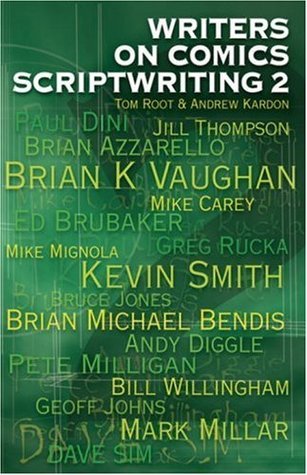In this second installment of "Writers on Comics Scriptwriting", I became acquainted with authors both entirely foreign to me (such as Mike Mignola and Jill Thompson) and those whom I am dearly familiar (such as Geoff Johns and Greg Rucka).
Mignola exhibits a laid-back, regular-guy attitude that's very easy to like. I've never read his comic "Hellboy," but I've heard good things about it. I believe that I will give it a look now that I see that its author seems like such a cool dude.
Rucka, meanwhile, surprised me with his overall attitude. I read "Gotham Central" which he co-wrote with Ed Brubaker (also interviewed in this book), and I got the general idea of what his outlook on life was. In a nutshell, Rucka is a brilliant writer, but I'm not sure I'd like to hang out with him.
The other writers covered in this book either made me wan to read their books or made me want to stay away entirely. Brian K. Vaughan's interview was an interesting read. His "Y: The Last Man" was already on my to-read list, and now I'm more intent than ever get around to it.
On the other hand, the interview with Kevin Smith, whose work on "Green Arrow" I have read, failed to impress me. He seems like a generally likable guy, aside from his foul mouth. However, my opinion of him as a writer did not improve. (I didn't know he was responsible for the film "Dogma." Woof!)
The one other author whose work I felt a need to seek out and read after finishing this book was that of Dave Sim, the author of "Cerebus." Sim's work seems like the sort of thing I'd be into, similar to that of Chuck Dixon, but with more epithets. That last part is not something I look forward to.
I do recommend this book to those interested in learning more about the writing habits and techniques of some of the best in the business, circa 2004. In fact, I'd be glad if something like this was put together for the hot-shot writers of today.
As a side-note, the author of volume 1 of this series, Mark Salisbury, also wrote a book called "Artists on Comic Art." I intend to read it later in order to get a look at the other half of comics creation.

